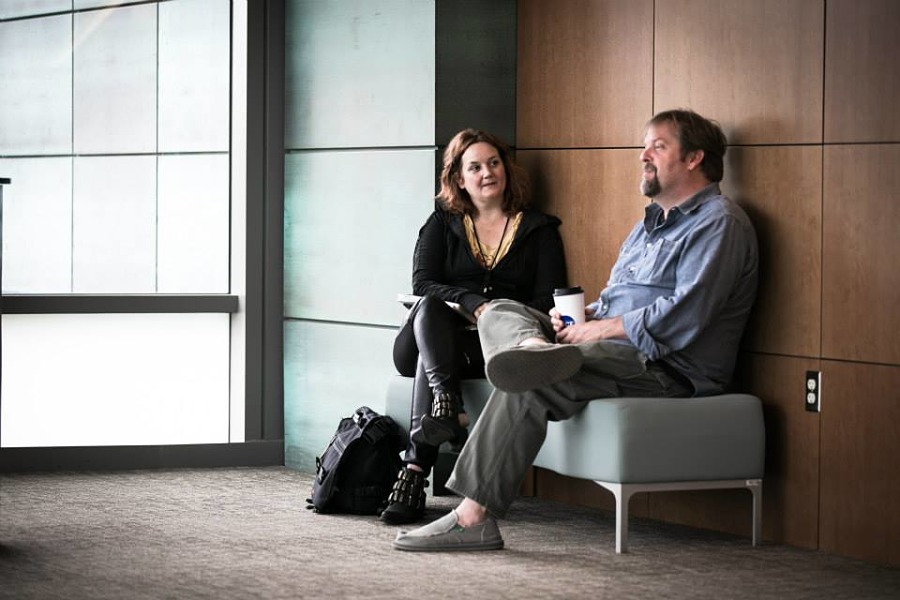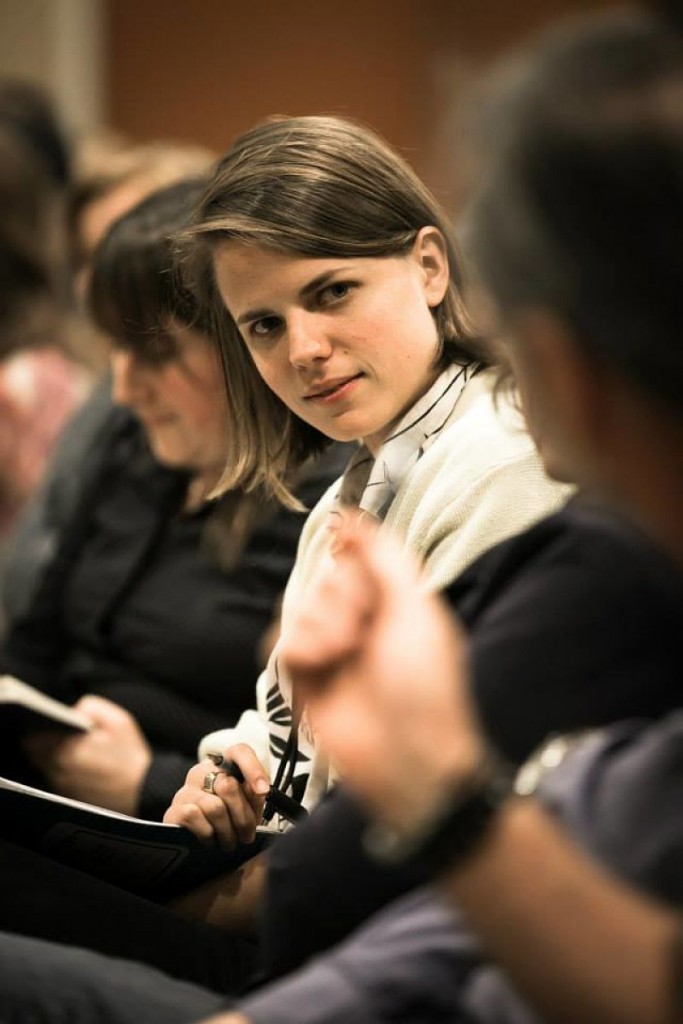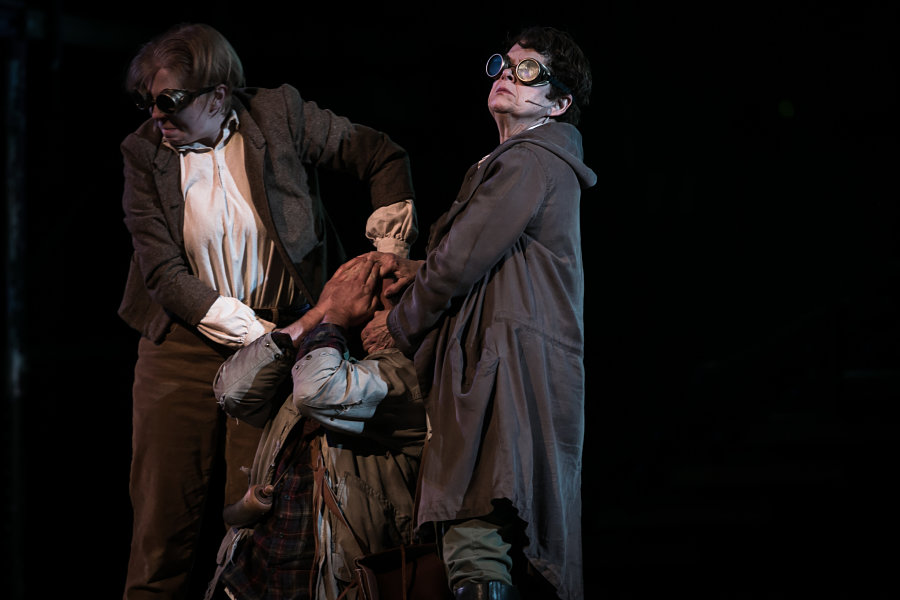OMAHA, NEB.: Last week, May 23–30, was the 10th year of the Great Plains Theater Conference, affectionately known as “Theatre Camp” to its alumni. With 10 years of careerbuilding playmaking under its belt, the conference has grown into what no less an eminence than Mac Wellman has called “one of the most important clearinghouses and way stations for serious theatremakers from all over the country.”
Since the beginning, with Edward Albee as its flagship playwright, the GPTC has welcomed some of the country’s most talented, prolific emerging and aspiring playwrights, directors, technical whizzes, dramaturgs, actors, etc., into her loving Midwestern arms and given them the permission to create something magical. And they have.
Held on the lush, green grounds of an historical fort, Metropolitan Community College in Omaha, the most recent conference consisted of seven days of play lab readings, feedback from established career folk, nighttime theatrical events, lunchtime panels, its own fringe festival, a play slam, legendary party porches and (most importantly) plenty of terrific food. For the final week of May each year, the campus is transformed into a mini-creative compound, basking in the glow of the excitement of new work. There’s an undeniable electricity created when people find their “village”; for many, the GPTC is a homecoming of the mind.
The conference was the brainchild of Dr. Jo Ann McDowell, who has championed many pro-playwright ventures, including the Last Frontier Theater Conference in Valdez, Alaska, and the William Inge Theatre Festival in Independence, Mo. Six years ago, Jodi—as she’s known around here—handed the reins over to Kevin Lawler and Scott Working, who are artistic director and associate artistic director, respectively.
Together, they have overseen the growth into maturity of a conference that has become increasingly important. Both Lawler and Working have a strong background in arts administration, having launched their own theatres in the early 1990s in Omaha, pulling double duty as playwrights and actors. The Blue Barn Theater, which Lawler cofounded in 1989, and the Shelterbelt Theater, which Working helped jumpstart in 1993, still run successfully today as mainstays of the Midwestern theatre scene.

In recent years, Lawler has made bold choices in programming the conference in alternative and experimental theatre spaces, moving away from its proscenium beginnings. Sites have included a baseball field, an abandoned train station, a parking lot and birthsite of the Malcolm X, to name a few. These choices have had a polarizing effect on audiences: Some enjoy the experience of a nontraditional setting and go along for the ride; others, not so much. Constance Congdon made her stance very clear, recollecting a time when her custom-designed Take Me to the River set blew away during a tornado watch in 2013.
“I fucking hate outdoor theatre,” she confessed to roaring applause last week during a night of shared memories and new scenes.
Lawler is unfazed. A forceful mind whose gentle voice, stooped posture, shoulder-length hair and messenger bag belie radical thoughts on how we make theatre and what theatre can mean to a community, he embraces the word amateur, citing its the word’s etymology (“a lover of” in Old French). In his case, the love is for community, progress and, yes, outdoor theatre spaces, which for him embody the openness with which he approaches nearly everything, including making all nighttime events free and open to the city. My personal opinion is that he has no plans to come back inside any time soon.
There is always a certain amount of “buzz” in the air about particularly striking shows. Usually these shows have been chosen as part of the Mainstage Series, a set of five extraordinary new pieces performed in front of notable panelists and with no events in a competing time slot. Every year it is said that these shows grow in quality, and this year was no different.

Yale graduate Sarah DeLappe’s The Wolves, a 162-page teenage girl chat fest about a high school soccer team, was among this year’s standouts. Zipping through in an impressive 90 minutes with a frenetic energy and overlapping colloquial language, the show stole its audience’s attention as quick as one could say, “As if.” In wild juxtaposition was Kenley Smith’s Akuma-Shin, a comic, melodramatic Godzilla tale in which tragedy and satire coexist. The Nashville-based Smith is a rare threetime GPTC mainstage playwright.
Nebraska-based playwright Ellen Struve’s adventurous historical piece Prince Max’s Trewly Awful Trip into the Desolate Interior was a dramatic highlight of the week. Directed by Lawler, Prince Max was a fully realized production that transcended time and media; it even opened with a well-paced behind-the-scenes video, like a trailer for the show itself. The show that followed didn’t disappoint: It proved as vast and exciting a play as the Karl Bodmer journals and paintings that inspired it. Struve is on her way to PlayPenn in July, where she’ll continue the long journey this piece is sure to take her on.
Meanwhile, a scaled-back GPTC fringe this year, coordinated by six-time returning San Francisco writer Andrea Hart, featured short scenes by some key players. Eliza Bent (an American Theatre contributor) regaled us with hilariously TMI selections from her recent one-woman show Toilet Fire. L.A.’s Moving Arts founder Lee Wochner reminded us that we are always being watched through a tiny rip in the fabric of time—by a Nebraskan couple who occupied the campus’s “Mule Barn” 100 years ago and asked, very concerned, ”What’d you do to the mules?”

Overall, the shows this year represented a departure from traditional play structures, showcasing a more experimental ethos, both in their setup as well as in their texts. Few and far between were the 90-page Act One, Act Two, beginning-middle-end plays. Indeed, many forfeited act breaks altogether, proving surprisingly succinct. Some were written in prose, delving into the realm of language play.
Dramaturg Emma Goldman-Sherman said she saw a common thread on the minds of the playwrights.
“I was impressed with the quality and the breadth of the plays at GPTC,” Goldman-Sherman wrote in an email. “The 10 plays I was assigned to dramaturg, and the other five I was additionally able to experience, were all concerned with our American experience. They are bold, new responses to life today.” She singled out Howard Emanuel’s Sundogs, about “how American soldiers and their families experience the effects of war,” as a favorite.
Sundogs, part of the Mainstage Series, was masterfully directed by Brooklyn College’s Mary Beth Easley. Rounding out the series were Lindsey Ferrentino’s This Flat Earth, an arresting musical drama tackling life after a school shooting, and David Hope’s Washington Place, an historically accurate retelling of the Triangle Shirtwaist Company fire of 1911.
Ruth Margraff, a professor of playwriting of the Art Institute of Chicago, and notable playwright and performer in her own right, is a multiyear GPTC contributor. She summed up the experience in the most Nebraskan of terms.
“GPTC is by far an Omaha steak prime cut above all other playfests I’ve ever been to,” she said. “There is art at the root of every stage in the design of visionaries Kevin Lawler and Scott Working, who are brilliant artists themselves.” She praised the “social graces” of the special events director Kay Friesen, calling her team “locally rooted, professionally rigorous and nationally savvy,” before returning to the beef analogy, saying that GPTC “serves up the filet mignon of playwriting chops because the submissions are blind and competitive—more than 600 scripts submitted for 29 coveted slots read by a changing panel of readers.
“The styles shift from play to play but there is a heartland sustenance at each core,” she continued. And the conference allows “time and space to meet everyone. So the days seem longer and the sky wider as we stroll between the mule barn and farm-to-table gourmet meals, daydreaming up the future.”
This year several former featured playwrights were invited back to reflect on their time in Omaha, including Lee Blessing, Doug Wright, Kia Corthron and conference favorite Congdon. Omaha has become a place where those glistening beacons of hope that there is still a career in playwriting shine down upon us, eat lunch next to us, share a beer with us and assure us that actually, no, there is no career in playwriting—but it’s all going to be okay.
The GPTC makes us forget our collective uphill artistic battle in favor of a deliberate, delicious homestead. There is a warmth and fast camaraderie on offer once a year in Omaha—a place where playwrights can lay down their grinding routines and remember why it is they take to the page in the first place, where they come face to face with the other names in the mile-high submission piles across America and snap late-night pictures on an old wraparound porch, accompanied by promises to “add you tomorrow.”
It may sound hopelessly romantic, but one thing I’ve learned in 10 years of Theatre Camp is that regardless of where we sit in our varying careers, the bittersweet choice of life as a playwright means that we’re all in this together.
Beaufield Berry is an award-winning Nebraska-based playwright (Psycho Ex Girlfriend, The Waiting Line) and founder of the Wild Dreamer Playwriting Retreat.


